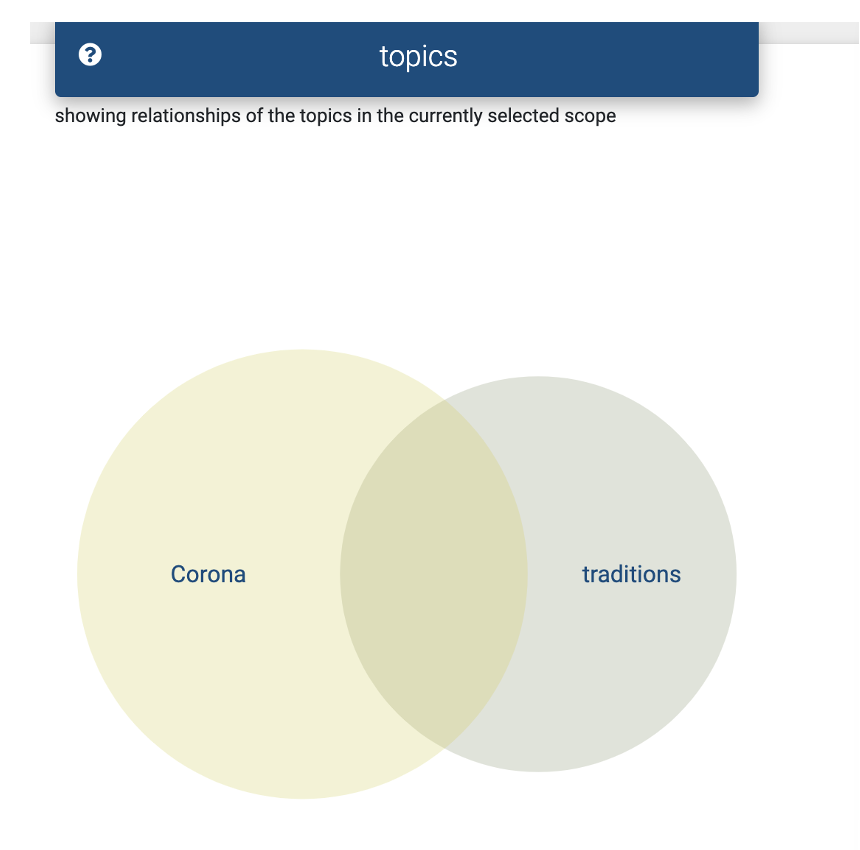Insights from the dashboard: The impact of COVID-19 on religious behaviour
Insights from the dashboard:
The impact of COVID-19 on religious behaviour
The topics of COVID-19 and tradition were trending on the EARS dashboard over the last three months. This article will show how it is possible to identify key themes and insights regarding the relationship between COVID-19 and traditional religious behaviour by using the dashboard tool.
Over the three-month period between December 1st, 2020 and March 1st, 2021, the EARS dashboard gathered a total sample of 588 articles on the topics of ‘COVID-19’ and ‘tradition’. 110 of these considered the intersection between COVID-19 and tradition. Thus, 18.7% of the articles overlapped. Across these 110 articles, two key themes were identified as significant in relation to these overlaps. The first is creative ways to celebrate restricted rituals and religious services. This theme was analysed in this previous article.

The second theme that emerged from the dashboard is the impact of COVID-19 on faithful. Did the pandemic positively or negatively impact the relationship between the faithful and religious institution and practices? Did people get closer to their traditions in this time of crisis, or has the closing of churches and religious institutions made it more difficult to preserve their traditions?
It emerges from the dashboard that European countries experienced a change in religious behaviour due to COVID-19. Some European countries have testified an increase in religious closeness in behaviors,[1] while others have lamented a decline in church attendance.[2] Let’s expand on these phenomena more at large.
The Netherlands: church shopping
As a result of the COVID-19 crisis, most churches in the Netherlands have gone online. According to scholar Ernst van den Hemel, the digital revolution of church services lead to more ‘church shopping’, as it is easier to tune in at another service. This phenomenon may also increase the so-called ‘multiple religious belonging’, where people combine multiple religions, as they see less contrast between religions.[3]
It appears that these online services are highly popular. For example, a church in Gouda, the Netherlands, streams their services, and those videos are available for re-watching up until two weeks after the service. Many people use this ‘on-demand’ service opportunity.[4] Nevertheless, research conducted by the Dutch foundation Kerkbalans (church balance), conducted among 3,000 churchgoers, has found that out of all the changes made to church services due to COVID-19, singing together is missed the most. Singing is an important part of the liturgy in both Protestant and Catholic churches.[5]
France: baptism
In France, the pandemic and related restrictions have weighed on the preparation of many catechumens for baptism. Despite this, the number of baptisms of young adults has increased by 5% compared to 2019. Yet, the numbers are falling in rural areas. Rural parishes do not have the same human and technical means as urban parishes to maintain the close links that are essential during this period of preparation and introspection. Moreover, while the catechumens were able to provide valuable help in using digital technologies, many still argue that the use of social networks or digital tools makes it difficult to create a group spirit and conviviality.[6]
Spain: decline in church attendance
In Spain, the Archbishop of Valencia, Antonio Canizares, has published a letter in which he expressed his sadness about the decline in attendance to services since the beginning of the coronavirus pandemic. Canizares explained that during his last Sunday service, when he entered the Cathedral to celebrate mass, he saw that it was almost empty, and that the maximum capacity imposed by COVID-19 rules had not even been reached. He also stated that other clergy members are seeing the same thing happen across the diocese.[7]
Romania and Bulgaria: breaking the rules
On the other hand, in Romania, thousands of followers of the Romanian Orthodox Church gathered for the epiphany at the harbour of the Black Sea port of Constanta in January 2021, despite social distancing rules which were intended to stop such events.[8]
Archbishop Teodosie, who led proceedings in Constanta, has repeatedly violated restrictions, holding services indoors for unmasked crowds as well as continuing to organise pilgrimages despite them being banned.[9]
Similar gatherings to celebrate the Epiphany were held in Bulgaria. Romanian authorities had banned public gatherings but stated that they would permit 3,000 people with face masks to attend the open-air service. However, the number of people exceeded the limit and many people, some without masks, joined a tightly packed crowd being blessed by holy water. [10]
Poland: faith decrease
In the meantime, in Poland, the Council of Bishops of the Polish Orthodox Church wrote about the spiritual relaxation of society and the loss of faith, in a letter on the occasion of Christmas. In the opinion of the hierarchies, the experience of the pandemic contributes further to a decrease in faith.[11]
Two opposite trends
From the analysis of articles in the dashboard about the intersection between COVID-19 and tradition, two opposite tendencies emerge. Some countries have reported an increase in church attendance and religious behaviours. Others have experienced the breaking of the COVID-19 restrictions by faithful. On the other hand, some countries underwent a decrease in church attendance and a tendency towards a more superficial and consumerist way to attend church. These findings therefore point out that during a crisis, religious behaviours are usually profoundly affected, but the direction of the effect – either positive or negative – depends on the specific country and context.
Learn more
The EARS dashboard allows you to gain insight into a large number of topics, including religion and COVID-19. It is a free tool that enables you to make similar connections as described above, and to find out about new relationships between interesting subjects across Europe. Please visit the dashboard to learn more.
[1] En temps de Covid, le chemin sinueux vers le baptême Abonné
[2] Cardenal Cañizares: “Cuando más se necesita, los fieles se quedan sin la Eucaristía dominical. Me dan ganas de llorar”
[3] Er zal meer ‘geshopt’ worden tussen kerkdiensten
[4] Er zal meer ‘geshopt’ worden tussen kerkdiensten
[5] Met een online dienst kunnen de meeste kerkgangers wel leven, maar één ding missen ze enorm
[6] En temps de Covid, le chemin sinueux vers le baptême Abonné
[7] Cardenal Cañizares: “Cuando más se necesita, los fieles se quedan sin la Eucaristía dominical. Me dan ganas de llorar”
[8] In Romania, Bulgaria, thousands defy Covid, crowding for Epiphany
[9] In Romania, Bulgaria, thousands defy Covid, crowding for Epiphany
[10] In Romania, Bulgaria, thousands defy Covid, crowding for Epiphany
[11] Prawosławni duchowni: Przez pandemię dochodzi do ochłodzenia wiary






